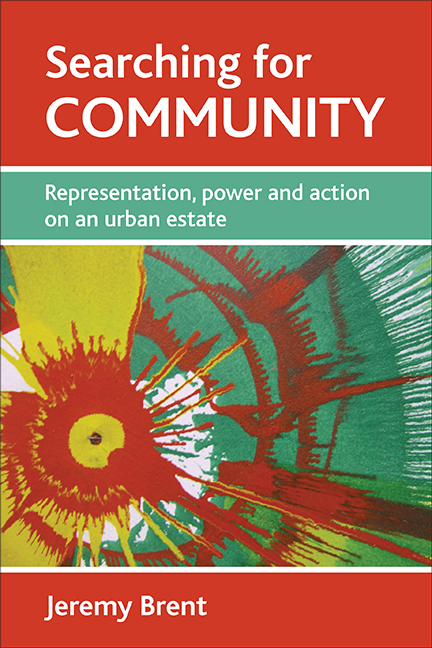Book contents
- Frontmatter
- Contents
- Foreword
- Notes on the author
- Introduction
- one Four settings: contexts and questions
- two Researching Southmead: problems of representation and participation
- three The intelligent outsider? Official and media representations of Southmead
- four Knowledge from within: community art and local representations
- five The outsider within: crossing worlds
- six Young people and community: trouble and tribes
- seven Four examples of community action in Southmead
- eight What is community anyway?
- nine Engaging with community
- ten Communicating what youth work achieves: the smile and the arch
- Author’s acknowledgements
- Epilogue: Southmead eight years on
- Afterword: Why Jeremy Brent’s work is more relevant than ever
- Bibliography
- Index
six - Young people and community: trouble and tribes
Published online by Cambridge University Press: 22 January 2022
- Frontmatter
- Contents
- Foreword
- Notes on the author
- Introduction
- one Four settings: contexts and questions
- two Researching Southmead: problems of representation and participation
- three The intelligent outsider? Official and media representations of Southmead
- four Knowledge from within: community art and local representations
- five The outsider within: crossing worlds
- six Young people and community: trouble and tribes
- seven Four examples of community action in Southmead
- eight What is community anyway?
- nine Engaging with community
- ten Communicating what youth work achieves: the smile and the arch
- Author’s acknowledgements
- Epilogue: Southmead eight years on
- Afterword: Why Jeremy Brent’s work is more relevant than ever
- Bibliography
- Index
Summary
Introduction: young people and their relationship to Community
We have seen in previous chapters that many of the concerns about poor areas are not about poverty or inequality, but about behaviour. The way people behave (or act – a word with different connotations) in these areas is bound up with ideas of community or its lack, with criminal behaviour and lack of community action identified as destructive of good community. I want to look more closely at this relationship between behaviour, action and community in Southmead; young people's ‘behaviour’ and adult's ‘action’ are the subjects of this and the following chapter.
The behaviour of young people features as a major issue in representations of Southmead. Outside surveys fasten on young people and their behaviour as a principal problem of the area, and the community play portrayed the vexations of young people's conduct as an endemic factor of Southmead life. This focus on young people and their behaviour as a problem to community is wider than Southmead. Saul Alinsky, an evangelist for community organisation from Chicago, first writing in 1946 but influential among community groups years later, wrote of the common example of problems of youth and delinquency as being ‘one of the most frequent problems characteristic of the average community council’. His view was that to treat these problems as separate from all the other problems that communities face was a fallacy, merely providing the trimmings of special programmes that do not tackle fundamental issues. He used the visible issues of young people and crime to lead into fundamental questions of community and power; for him, the two are inseparable. Sheila Brown, in her extensive survey of both adults and young people in Middlesbrough, which started out as a study of young people and crime, but shifted its focus to the study of age as a social division, found the two issues of young people and community strongly intertwined in people's own accounts:
Older adult attitudes towards crime and young people, then, may be fairly summarised as one which recognises the gravity of economic decline; which sees unemployment and poverty as contributing to moral decline; which regrets a perceived deterioration of order and community; but which in the end sees young people, not as victims, but rather as perpetrators and as both symptom and cause of the collapse of the moral universe.
- Type
- Chapter
- Information
- Searching for CommunityRepresentation, Power and Action on an Urban Estate, pp. 149 - 174Publisher: Bristol University PressPrint publication year: 2009



